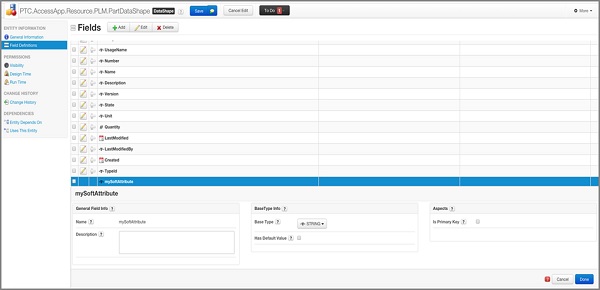Thingworx is a platform for the rapid development and deployment of smart, connected devices. Its set of integrated IoT development tools support connectivity, analysis, production, and other aspects of IoT development.
It offers Vuforia for implementing augmented reality development, and Kepware for industrial connectivity. KEPServerEX provides a single point for data distribution, and facilitates interoperability when partnered with a ThingWorx agent.

Components
Thingworx offers several key tools for building applications. These tools include the Composer, the Mashup Builder, storage, a search engine, collaboration, and connectivity. The Composer provides a modeling environment for design testing. The Mashup Builder delivers easy dashboard building through common components (or widgets); for example, buttons, lists, wikis, gauges, and etc.
Thingworx uses a search engine known as SQUEAL, meaning Search, Query, and Analysis. Users employ SQUEAL in analyzing and filtering data, and searching records.
Interface
The ThingWorx platform uses certain terms you must familiarize yourself with. In the main screen's top menu, you search for entities or create them. “Entity” refers to something created in ThingWorx. You can also import/export files and perform various operations on them.
In the left menu, you find entity groups, which are used to produce models and visualize data; and manage storage, collaboration, security, and the system.

When you select the Modeling category in the menu, you begin the process by creating an entity. The entity can be any physical device or software element, and it produces an event on changes to its property values; for example, a sensor detects a temperature change. You can set events to trigger actions through a subscription which makes decisions based on device changes.
Data Shapes consist of one or more fields. They describe the data structure of custom events, infotables, streams, and datatables. Data shapes are considered entities.

Thing Templates and Thing Shapes allow developers to avoid repeating device property definitions in large IoT systems. Developers create Thing Templates to allow new devices to inherit properties. They use Thing Shapes to define Templates, properties, or execute services.
Note a Thing only inherits properties, services, events, and other qualities from a single template, however, Things and templates can inherit properties from multiple Thing Shapes.
Development
ThingWorx actually requires very little programming. Users connect devices, establish a data source, establish device behaviors, and build an interface without any coding. It also offers scalability appropriate for both hobbyist projects and industrial applications.
No comments:
Post a Comment